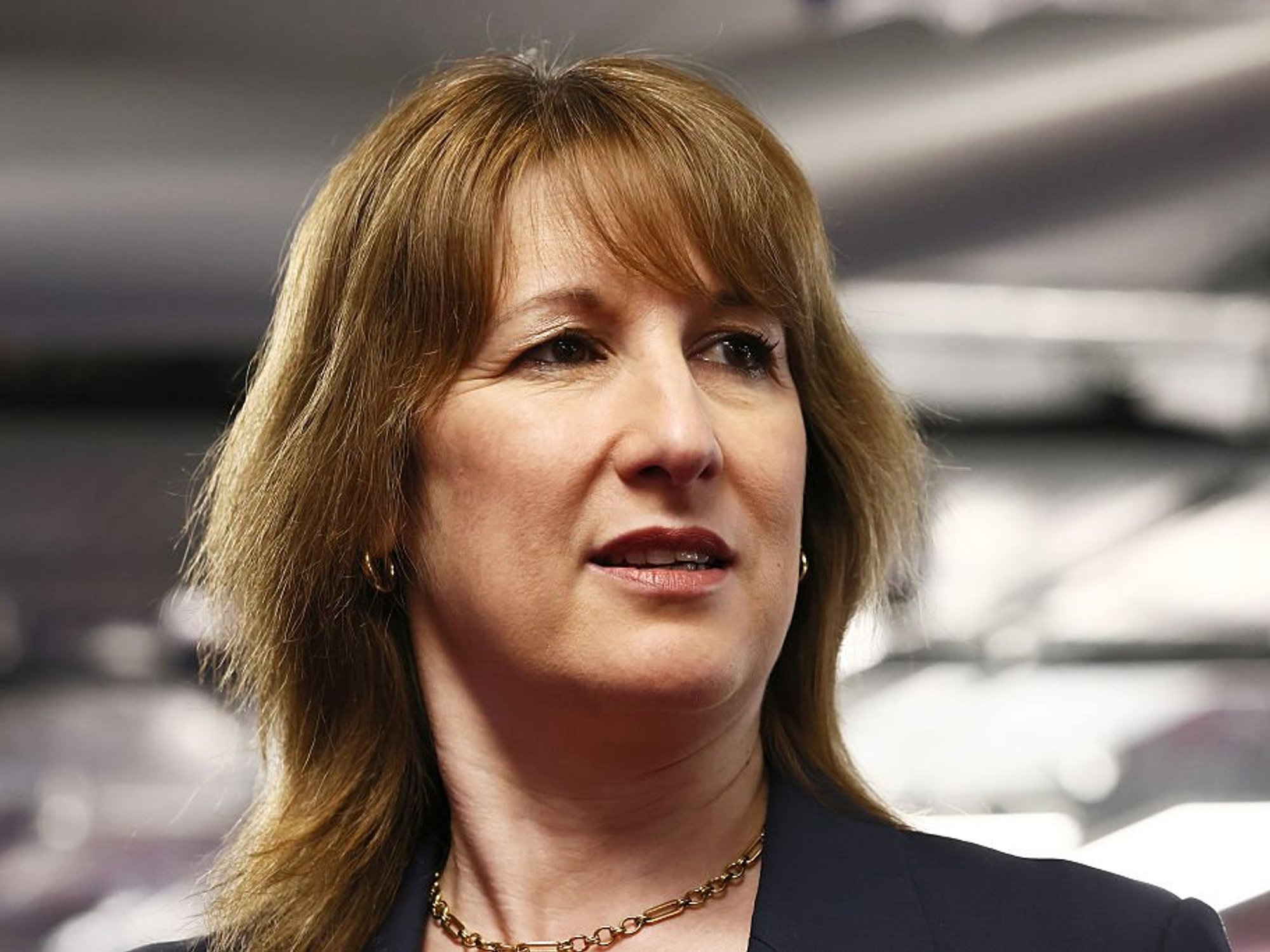UK Government drops demand for iPhone users' data, paving the way for Apple security tool to return
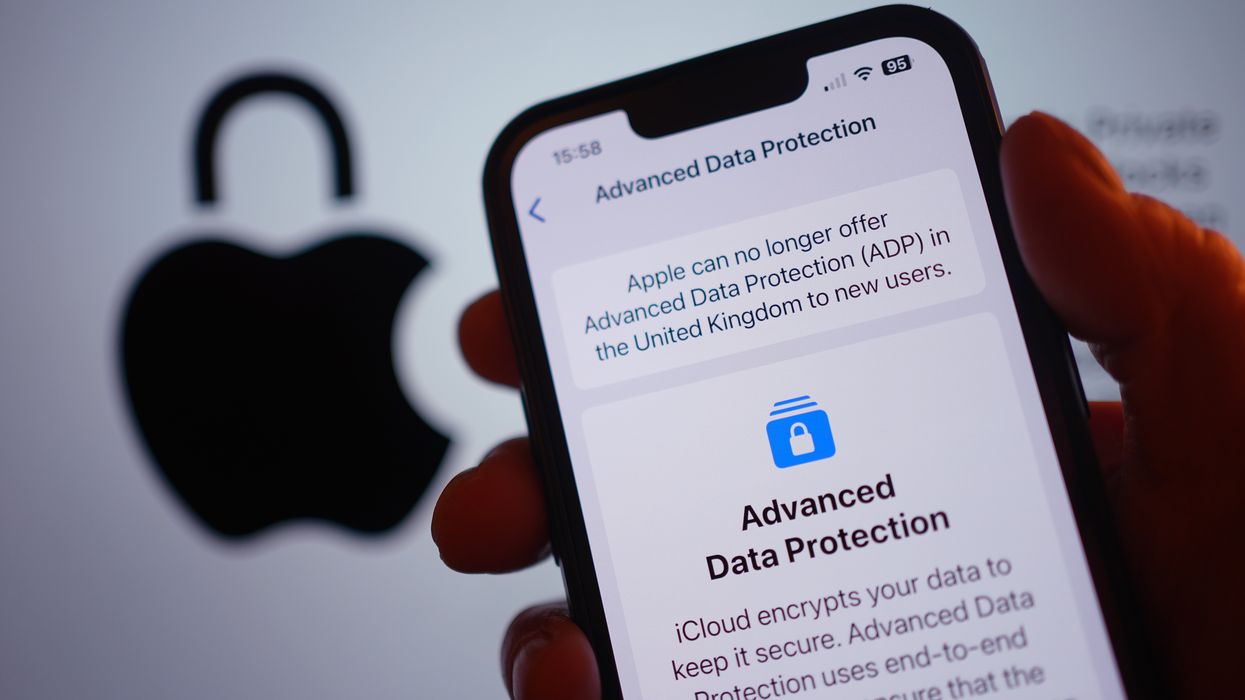
Britain has dropped the demand for access to Apple user data
|PRESS ASSOCIATION
There's no confirmation for when security protections will be put back in place
- UK Government dropped its request to access users' data
- Apple had brought legal action against the Home Office over demand
- Advanced Data Protection (ADP) was withdrawn in the UK
- New iPhone, iPad, and Mac users couldn't enable it
- There's no confirmation for when ADP will be reinstated
Don't Miss
Most Read
Latest
The UK Government has dropped its demand to access user data from Apple devices, paving the way to restoring the strongest level of protection for iPhone, iPad and Mac owners nationwide.
Downing Street had requested that Apple provide a "backdoor" that would have enabled access to users' protected, encrypted data.
Apple CEO Tim Cook has previously argued that creating a backdoor for encrypted services "would be the equivalent of a master key, capable of opening hundreds of millions of locks — from restaurants and banks to stores and homes."
"No reasonable person would find that acceptable," the 64-year-old executive argued in an open letter.
If Apple had moved forward with the request from the UK Government and there was a way to access encrypted data, there would be no way to limit its access to this country — impacting millions of citizens worldwide.
In response to the request, Apple revoked its highest tier of data protection for iPhone, iPad, and Mac owners living in the UK in February. The security tool — known as Advanced Data Protection (ADP) — used end-to-end encryption to scramble the "majority" of your files before they were uploaded to iCloud for backup.
This process meant that only you could access the contents of the files. Not even Apple can peek at the files, photographs, and other data stored via its iCloud service.
Apple made this decision following the UK order, as they did not want to abide by the request. The iPhone-maker subsequently withdrew ADP for all new users and brought legal action against the Home Office.
Over the past few months, I’ve been working closely with our partners in the UK, alongside @POTUS and @VP, to ensure Americans' private data remains private and our Constitutional rights and civil liberties are protected.
— DNI Tulsi Gabbard (@DNIGabbard) August 19, 2025
As a result, the UK has agreed to drop its mandate for…
President Donald Trump's spy chief Tulsi Gabbard posted on X that the UK has agreed to end the request for the US tech giant after working alongside American president Donald Trump, vice president JD Vance and British counterparts “over the past few months”.
She posted: “As a result, the UK agreed to drop its mandate for Apple to provide a ‘back door’ that would have enabled access to the protected encrypted data of American citizens and encroached on our civil liberties.”
The move to drop the request comes after Britain had long worked with the US to tackle security threats while seeking to protect the privacy of citizens in both countries. "We will always take all actions necessary at the domestic level to keep UK citizens safe," said a spokesperson from the British government.
Apple did not immediately respond to requests for comment on Gabbard's statement.
However Conservative MP David Davis reacted by stating: “The Government’s decision to drop its demands for a backdoor to Apple’s encryption are to be welcomed. Such a backdoor would only serve to weaken the protection given by encryption to all of us from malicious actors.”
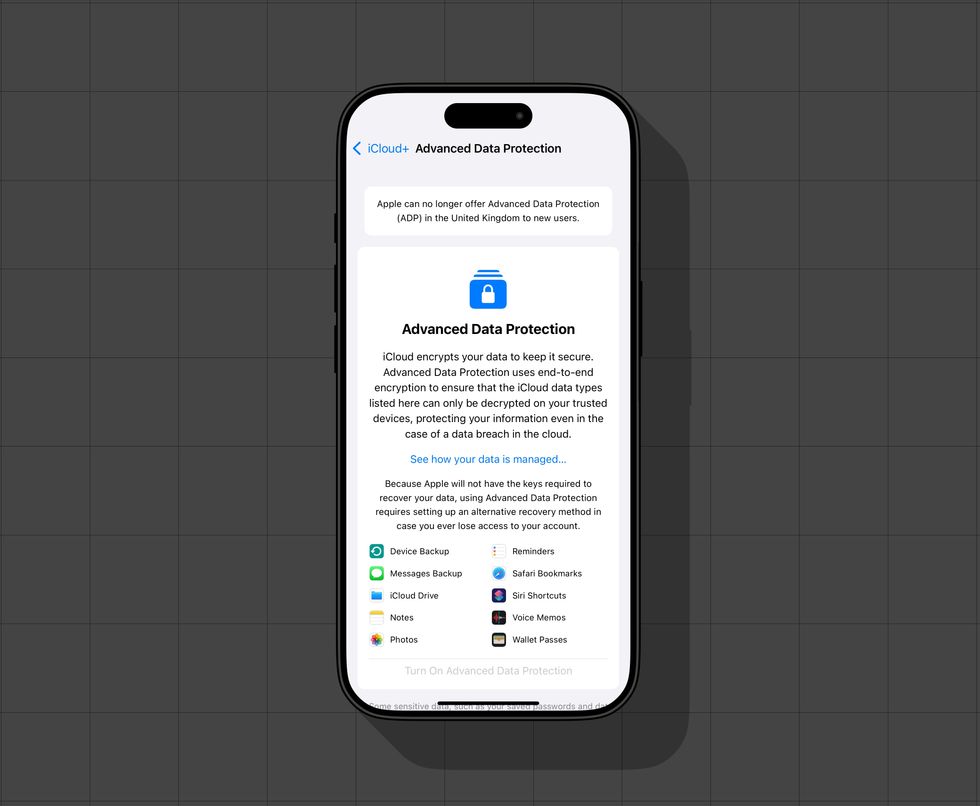
iPhone owners in the UK who haven't already enabled Advanced Data Protection are currently unable to flip the switch and activate this top-tier level of encryption
|APPLE | GB NEWS
Why did the UK demand access in the first place?
Earlier this year, it was reported that UK Government had issued a notice under the Investigatory Powers Act 2016, asking Apple for the ability to access data from Apple users.
No. 10 made this request to help the police forces crack down on crime. They argued that these data protection laws, while beneficial for most people, were stopping police forces from being able to catch criminals.
This was said to include encrypted data protected by the tech giant’s Advanced Data Protection (ADP) tool, an opt-in tool within Apple’s iCloud service, which only an account holder can decrypt the data — everything is out of reach of even Apple.
Even with ADP disabled for some in the UK, some data — like passwords, payment information, and iMessage chat history — remains end-to-end encrypted and not accessible to Apple or law enforcement without a warrant.
If you're unfamiliar with end-to-end encryption, it's a secure communication method where messages are encrypted on the sender's device and can only be decrypted on the recipient's device.
If you're unsure whether ADP is switched-on on your device, here's how you can check...
Step 1: Open the Settings App
Head straight into Settings on your iPhone. This is your command centre for all things Apple, and where iCloud’s most important security settings live.
Step 2: Tap on Your Apple ID Banner
Right at the very top of Settings, you’ll see your name and profile picture. Give that a tap — this opens your Apple ID dashboard, where iCloud lives.
Step 3: Go Into iCloud Settings
Next, select iCloud. This is the hub for all the apps and services syncing with Apple’s cloud servers.
Step 4: Look for Advanced Data Protection
Scroll down until you find Advanced Data Protection. Apple puts this front-and-centre in the iCloud menu so you can’t miss it.
Step 5: Confirm It’s On
Here’s the clincher: if you see a green toggle and the status says “On”, then Advanced Data Protection is already enabled. Congratulations — your iCloud data is shielded by end-to-end encryption, meaning only you can access it.
If it says “Off”, you’re still on the standard iCloud security tier.
You can enable Advanced Data Protection right here, but bear in mind you’ll need to set up at least one account recovery method (like a trusted contact or recovery key) before Apple lets you switch it on.
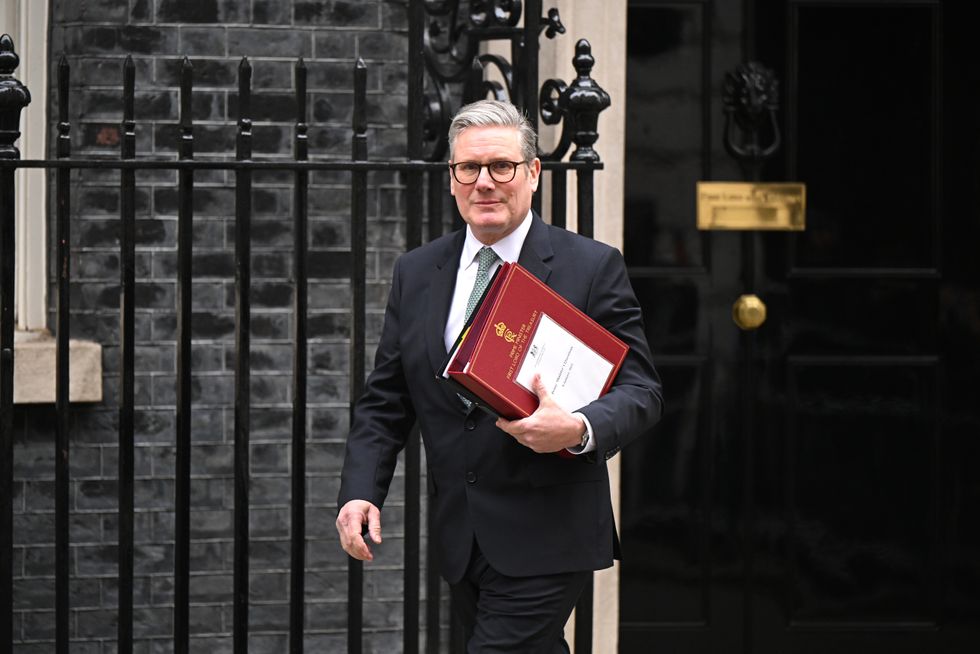
The Investigatory Powers Act, nicknamed the Snoopers' Charter, was passed under the Conservatives, but it's the Labour Government that's decided to use its powers to demand data from Apple
|GETTY IMAGES
Apple said it was "gravely disappointed" by a request to unlock these encrypted files from the UK Government, which can issue a legally-binding request under the Investigatory Powers Act 2016, nicknamed the Snoopers' Charter, which was passed under the last Conservative Government.
In a statement from Apple: “ADP protects iCloud data with end-to-end encryption, which means the data can only be decrypted by the user who owns it, and only on their trusted devices.
“Enhancing the security of cloud storage with end-to-end encryption is more urgent than ever before. Apple remains committed to offering our users the highest level of security for their personal data and are hopeful that we will be able to do so in the United Kingdom in the future. As we have said many times before, we have never built a backdoor or master key to any of our products or services and we never will.”
Apple says 14 types of data that can be stored on its iCloud service remain end-to-end encrypted without ADP, including health records. iMessage and FaceTime calls remain encrypted globally, including in the UK. This law empowers the police and security services to request internet connection records, intercept communications — like text messages and calls, and conduct bulk data collection on Britons.
Broadband providers, smartphone manufacturers, chat app developers, and other companies must enable this surveillance under warrants. And that's exactly what was requested from Apple.
Earlier in February, it was reported that Keir Starmer's Government had issued an order under the Investigatory Powers Act 2016 to access totally encrypted files from Apple users. The $3.7 trillion company did not comment at the time.
However, chief executive Tim Cook has previously spoken out about the dangers of creating a way to access encrypted data — known as a “backdoor” — since this loophole could be exploited by hackers.
Apple went toe-to-toe with the FBI back in 2016 when it refused a request to create a backdoor for an iPhone used by the San Bernardino shooter, citing user privacy and security risks. The FBI, which eventually accessed the contents on the device using a third-party tool, filed a lawsuit against Apple over its refusal.
The case sparked a global debate over encryption, privacy rights, and government surveillance powers.
At the time, CEO Tim Cook described the request for a backdoor into its encryption like "a master key capable of opening hundreds of millions of locks — from restaurants and banks to stores and homes".
"No reasonable person would find that acceptable," he argued.
And now, it's the turn of the UK Government to request that Apple strips away its strongest level of protection. Except this time, Apple has decided to shift its policy.
Apple withdrew its Advanced Data Protection tool from the UK, turning it off as an option for those not already using it — and introduce a process to shift existing iCloud users away from the tool.
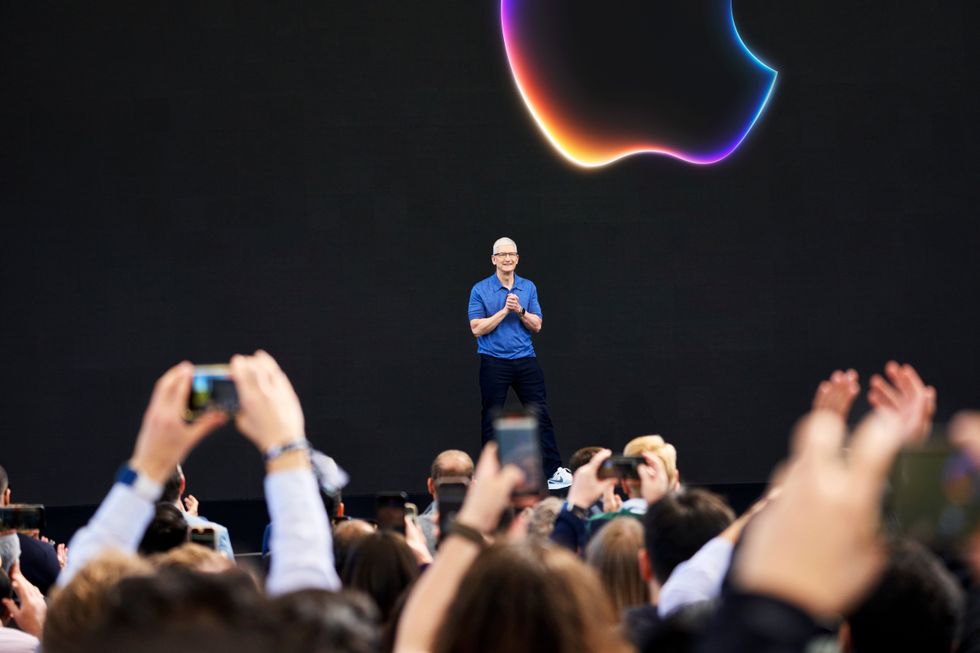 Apple CEO Tim Cook on-stage welcoming developers from across the globe to its annual WWDC event on its Apple Park campus in Cupertino, California | APPLE PRESS OFFICE
Apple CEO Tim Cook on-stage welcoming developers from across the globe to its annual WWDC event on its Apple Park campus in Cupertino, California | APPLE PRESS OFFICE A number of online safety charities, as well as police and security services around the world long warned of the dangers of end-to-end encrypted services, arguing that they allow offenders such as terrorists and child abusers to hide more easily.
Rani Govender, policy manager for child safety online at the NSPCC said this was an opportunity for Apple and other firms to consider other ways of protecting users, particularly children.
“We know that end-to-end encryption allows offenders to groom and manipulate children and build communities where they can share vile child sexual abuse material without detection,” Ms Govender said. “As Apple change their approach to encryption on their services, they must take this opportunity to ensure that they are considering other measures they can put in place to better protect children.
"All tech companies should be finding ways to tackle online risks to children whilst upholding privacy of their users, and Ofcom and Government should hold them accountable for doing so.”
Will Guyatt reacts to Apple removing a security feature
However, one security expert says the decision by Apple to strip its highest level security tool from millions of device owners in the UK will make them “more vulnerable to cyber threats”.
Dray Agha, senior manager of security operations at cybersecurity firm Huntress said: “Apple’s decision to pull Advanced Data Protection in the UK is a direct response to increasing Government demands for access to encrypted user data. Weakening encryption not only makes UK users more vulnerable to cyber threats but also sets a dangerous precedent for global privacy.
“Governments argue this helps law enforcement, but history shows that any backdoor created for one party can eventually be exploited by bad actors. The broader concern is that this move could pressure other companies to weaken their security, putting personal data worldwide at greater risk.”
Additional Reporting By Martyn Landi, PA Technology Correspondent









